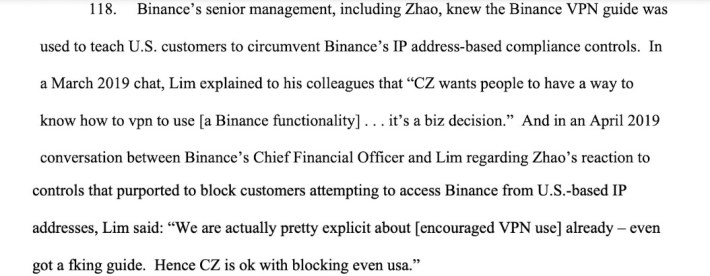As a job-creating, economy-driving Small Business Owner, I come to you with two Business Advice tips. First, you should disclose where your business is headquartered, and, second, if you suspect that people are using your business to facilitate the doing of crimes, you should not write things like, "Like come on. They are here for crime" or "we see the bad, but we close 2 eyes" in work communications that could ever conceivably become public. Those precise communications became public on Monday when the U.S. Commodity Futures Trading Commission filed a sweeping civil suit against Binance for alleged violations of the Commodity Exchange Act. The specific violations, and the brazenness with which Binance honchos are alleged to have committed them, are certainly interesting, though not as interesting as what they reveal about the lies at the heart of the cryptocurrency industry.
Binance, the largest cryptocurrency exchange in the world by a considerable margin, has spent the past five or so years trying, occasionally succeeding, but mostly failing to crack open the United States, the largest cryptocurrency market in the world by a considerable margin. One insurmountable issue for Binance and founder Changpeng Zhao (known as CZ) is that they have never taken much interest in playing by the rules regulating the buying and selling of fake money in the United States, which is a marked contrast from their erstwhile competitor FTX. While Sam Bankman-Fried's now-kaput exchange kept regulators at bay by pandering and donating to them, Binance chose to simply pretend those regulators didn't exist, never registering with the CFTC.
The key sticking point here is crypto derivatives trading, essentially a turbocharged form of crypto trading where buyers place bets on the future prices of, in this case, profoundly unstable assets. It's riskier, it makes up an estimated 70 percent of the crypto market, and it is not allowed in the United States. Binance oversaw $1.26 trillion worth of derivatives trading on its platform in January 2023. That mammoth figure could be significantly larger if U.S.-based traders were legally allowed into the casino, and the CFTC alleges Binance did everything they could to get their biggest customers in anyway, including publishing guide on their website walking users through the process of setting up a VPN. They were successful enough that 16 percent of derivatives volume came from the U.S.

In an attempt to make it appear legit, Binance underwent a supposed audit in October of 2020. According to a series of messages highlighted in the lawsuit, Binance employees were hilariously open about how much of a sham the audit was. Former Binance Chief Compliance Officer Samuel Lim said they picked an auditor who would "just do a half assed individual sub audit on geo[fencing] to buy us more time." Lim worked with Binance's Money Laundering Reporting Officer, who complained to her boss about the hoops she had to jump through, such as "need[ing] to write a fake annual MLRO report to Binance board of directors wtf." Binance does not have a board of directors, and Lim told her "'yea its fine I can get mgmt. to sign off on the fake report." The team also often discussed the ways in which their platform was used to facilitate money laundering and other illegal activities, and when they were made aware, they actively looked the other way to ensure that business stayed on their platform. As CZ put it, "We are already doing a lot of things that are obviously not in line with the United States."
All of that is bad for Binance and CZ, and will assuredly lead to a hefty fine and an order to cease U.S. operations. What is most intriguing, though, about the way Binance is alleged to have operated is the way it manipulated its own markets and stacked the deck for its biggest accounts. One central idea in the pitch for cryptocurrency is its supposedly decentralized nature. If all these digital assets are not hybrid gambling chips/unregulated securities, they must necessarily have some use case, and since advocates don't want to have to make the logical yet morally reprehensible case that fake money's most obvious uses are to facilitate the transfer of illegal goods and services, the rhetoric of decentralization comes to the fore. Participating in pump-and-dump schemes and accelerating the death of the planet is anti–big bank praxis, the logic goes.
Cryptocurrency markets are, specifically because they are unregulated, extremely susceptible to manipulation. The complaint charges that Binance offered special treatment to many high-roller accounts, such as someone in Chicago responsible for 12 percent of all the trading on Binance. It also identified three unnamed U.S. trading firms as important, helping them set up shell companies to continue trading on the platform without alerting regulators, and providing them preferential access to facilitate faster trading and therefore more advantageous positions than was available to normal customers. Or in computer language, they set up, "low-latency futures api/fstream . . . [to] carry a different domain than the public fapi/fstream . . . which will route to a more dedicated machine/gateway that open exclusively for MM and top tier VIP clients. So generally client can expect a slight 5-10ms latency reduction on roundtrip for normal trading environment and more normalized latency distribution (less extreme tail) in busy environment."
More concerning is that the company is also accused of operating around 300 accounts "that have engaged in proprietary trading activity on the Binance trading platform." This is definitional insider trading, though at a more dramatic scale, since it's clear that the volume of "wash trades" was enough to manipulate the market. So even a crypto trader who is knowingly and willingly in the game for the gambling aspect, liberated from rationalizations about decentralization, is still being played. Markets whose prices seem to be the product of millions of traders buying and selling cryptocurrencies, derivatives, shitcoins, all that, are really just casinos with stacked decks, moving things around and ensuring that you lose and they win.
The CFTC can't bring criminal charges, here, though it doesn't need to do so for Binance's U.S. operations to be seriously imperiled. The evidence they have is staggering, and all those loopholes seem likely to close soon. The SEC is also turning their attention towards Binance and other crypto players, so the game is likely up sooner than later. Though Binance is the biggest crypto exchange, you'd be foolish to think any of this scammy behavior begins or ends there.






